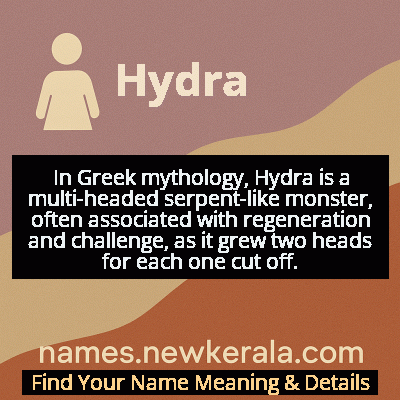Hydra Name Meaning & Details
Origin, Popularity, Numerology Analysis & Name Meaning of Hydra
Discover the origin, meaning, and cultural significance of the name HYDRA. Delve into its historical roots and explore the lasting impact it has had on communities and traditions.
Name
Hydra
Gender
Female
Origin
Greek
Lucky Number
2
Meaning of the Name - Hydra
In Greek mythology, Hydra is a multi-headed serpent-like monster, often associated with regeneration and challenge, as it grew two heads for each one cut off.
Hydra - Complete Numerology Analysis
Your Numerology Number
Based on Pythagorean Numerology System
Ruling Planet
Moon
Positive Nature
Diplomatic, friendly, artistic, empathetic.
Negative Traits
Over-sensitive, moody, indecisive, prone to self-pity.
Lucky Colours
Green, cream, white.
Lucky Days
Monday.
Lucky Stones
Pearl, moonstone.
Harmony Numbers
1, 3, 4.
Best Suited Professions
Diplomats, mediators, caregivers, artists.
What People Like About You
Cooperative spirit, friendliness, artistic talent.
Famous People Named Hydra
Hydra Lernaia
Mythological Creature
Legendary multi-headed water serpent slain by Hercules as his second labor
Hydra of Marvel Comics
Fictional Organization
Global terrorist organization in Marvel Universe known for its 'cut off one head, two more shall take its place' philosophy
Hydra (astronomy)
Celestial Constellation
Largest constellation in the night sky, representing the mythological water serpent
Name Variations & International Equivalents
Click on blue names to explore their detailed meanings. Gray names with will be available soon.
Cultural & Historical Significance
Extended Personality Analysis
The personality traits associated with the name Hydra draw heavily from the mythological creature's characteristics. Individuals with this name are often perceived as possessing remarkable resilience and adaptability - when faced with setbacks, they don't just recover but often emerge stronger and more multifaceted. The multi-headed nature suggests someone capable of managing multiple projects or perspectives simultaneously, though this can sometimes lead to perceptions of being unpredictable or hard to pin down. There's an inherent strength and intensity to the name, suggesting a person who commands respect and shouldn't be underestimated. The water element connection points to deep emotional currents and strong intuition, while the serpent imagery implies wisdom, transformation potential, and sometimes a mysterious aura. These individuals are often strategic thinkers who understand that some challenges require indirect approaches rather than head-on confrontation. They tend to be survivors who can regenerate from difficult circumstances, learning and growing from each experience.
Modern Usage & Popularity
In modern naming practices, Hydra remains exceptionally rare as a given name but has gained significant cultural recognition through various media. The Marvel Cinematic Universe's portrayal of HYDRA as a persistent antagonist organization has introduced the name to mainstream audiences, though this association with villainy may limit its adoption for children. However, among fantasy enthusiasts, mythology lovers, and those seeking powerful feminine names outside traditional conventions, Hydra holds appeal for its strong imagery and rich mythological background. The name occasionally appears in creative works, video games, and among communities that value unique, meaningful names. Its usage trends toward symbolic or character names rather than practical given names, though it occasionally surfaces in artistic or alternative circles. The name's powerful connotations of resilience and regeneration make it compelling for those seeking names that embody strength and the ability to overcome adversity through adaptability.
Symbolic & Spiritual Meanings
Symbolically, Hydra represents one of the most potent metaphors in Western mythology - the concept of problems that multiply when attacked without proper strategy. This 'Hydra effect' has been applied to everything from military tactics to business management and psychological challenges. The creature symbolizes the need for comprehensive solutions rather than superficial fixes, teaching that some issues have deep roots that must be addressed fundamentally. The immortal golden head represents the core of any problem that requires special attention or unique approaches. In alchemical and esoteric traditions, Hydra symbolizes the process of transformation and the multiplicity of existence. The water association connects it to the subconscious, emotions, and intuition, while the serpent imagery links to healing, wisdom, and cyclical renewal. In modern contexts, Hydra has come to represent resilient systems, networked organizations, and the idea that destruction can sometimes lead to proliferation rather than elimination - a concept relevant to everything from computer viruses to social movements.

